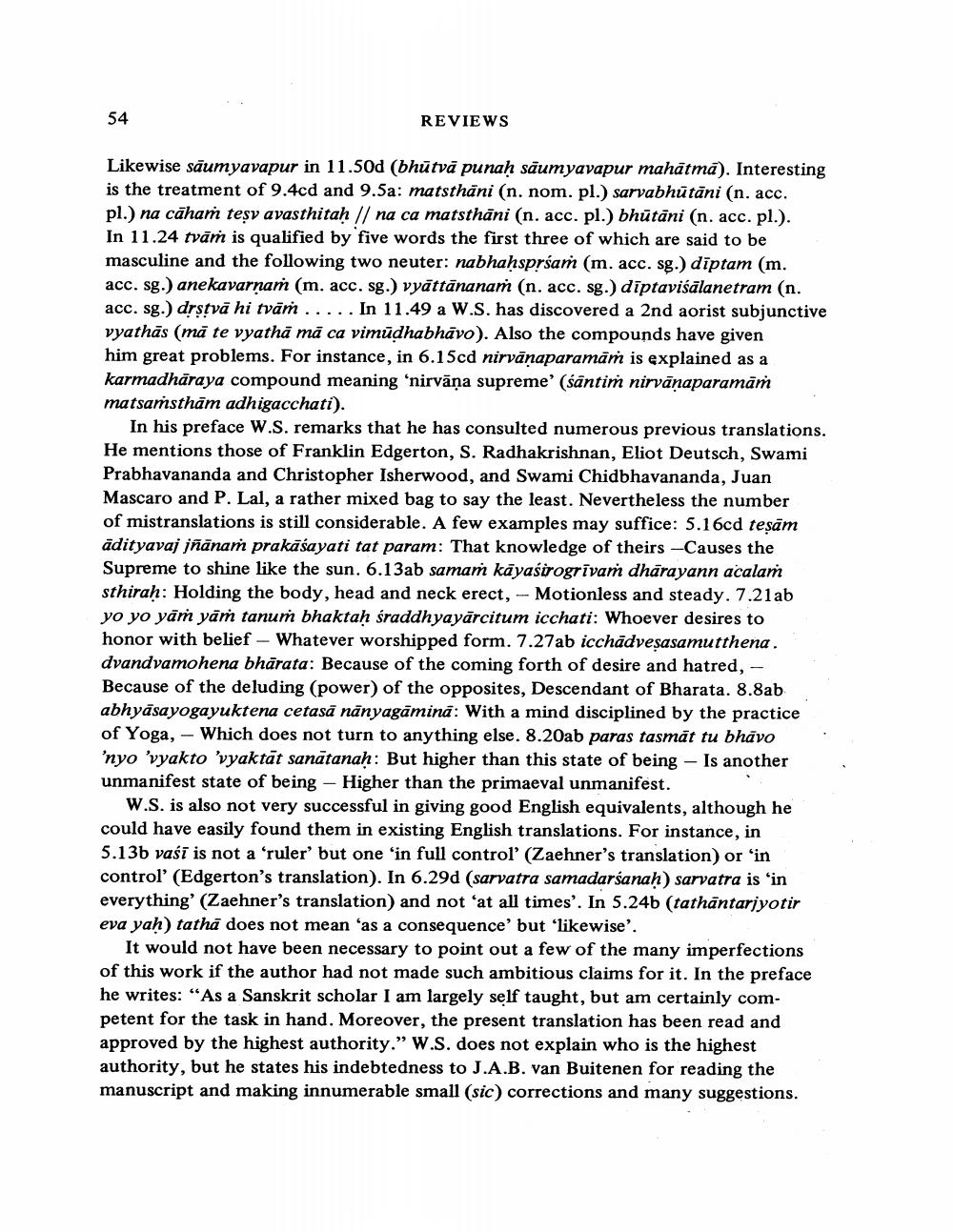Book Title: Reviews Of Diffeent Books Author(s): J W De Jong Publisher: J W De Jong View full book textPage 6
________________ 54 REVIEWS Likewise säumyavapur in 11.50d (bhūtvā punaḥ sāumyavapur mahātmā). Interesting is the treatment of 9.4cd and 9.5a: matsthāni (n. nom. pl.) sarvabhūtāni (n. acc. pl.) na cāham teşv avasthitah // na ca matsthāni (n. acc. pl.) bhūtāni (n. acc. pl.). In 11.24 tvāṁ is qualified by five words the first three of which are said to be masculine and the following two neuter: nabhaḥsprśam (m. acc. sg.) dīptam (m. acc. sg.) anekavarnaṁ (m. acc. sg.) vyāttānanaṁ (n. acc. sg.) diptaviśālanetram (n. acc. sg.) drstvä hi tvāṁ . . . . . In 11.49 a W.S. has discovered a 2nd aorist subjunctive vyathās (mā te vyathā mā ca vimūdhabhāvo). Also the compounds have given him great problems. For instance, in 6.15cd nirvanaparamāṁ is explained as a karmadhāraya compound meaning ‘nirvāṇa supreme' (śāntiṁ nirvānaparamāṁ matsaṁsthām adhigacchati). In his preface W.S. remarks that he has consulted numerous previous translations. He mentions those of Franklin Edgerton, S. Radhakrishnan, Eliot Deutsch, Swami Prabhavananda and Christopher Isherwood, and Swami Chidbhavananda, Juan Mascaro and P. Lal, a rather mixed bag to say the least. Nevertheless the number of mistranslations is still considerable. A few examples may suffice: 5.16cd tesām ādityavaj jñānaṁ prakāśayati tat param: That knowledge of theirs --Causes the Supreme to shine like the sun. 6.13ab samaṁ kāyasirogrīvam dharayann acalam sthirah: Holding the body, head and neck erect, - Motionless and steady. 7.21 ab yo yo yāṁ yaṁ tanuṁ bhaktaḥ śraddhyayārcitum icchati: Whoever desires to honor with belief - Whatever worshipped form. 7.27ab icchädvesasamutthena dvandvamohena bhārata: Because of the coming forth of desire and hatred, - Because of the deluding (power) of the opposites, Descendant of Bharata. 8.8ab abhyāsayogayuktena cetasā nānyagamina: With a mind disciplined by the practice of Yoga, - Which does not turn to anything else. 8.20ab paras tasmät tu bhāvo 'nyo 'vyakto 'vyaktāt sanātanah: But higher than this state of being - Is another unmanifest state of being - Higher than the primaeval unmanifest. W.S. is also not very successful in giving good English equivalents, although he could have easily found them in existing English translations. For instance, in 5.13b vaśī is not a 'ruler' but one 'in full control (Zaehner's translation) or 'in control' (Edgerton's translation). In 6.29d (sarvatra samadarśanah) sarvatra is 'in everything' (Zaehner's translation) and not at all times'. In 5.24b (tathāntarjyotir eva yah) tathā does not mean 'as a consequence' but 'likewise'. It would not have been necessary to point out a few of the many imperfections of this work if the author had not made such ambitious claims for it. In the preface he writes: "As a Sanskrit scholar I am largely self taught, but am certainly competent for the task in hand. Moreover, the present translation has been read and approved by the highest authority." W.S. does not explain who is the highest authority, but he states his indebtedness to J.A.B. van Buitenen for reading the manuscript and making innumerable small (sic) corrections and many suggestions.Page Navigation
1 ... 4 5 6 7 8 9 10 11 12 13 14 15 16 17 18 19 20 21 22 23 24 25 26 27
